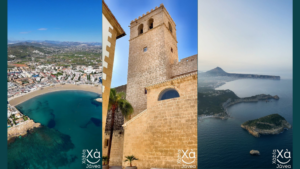Spain acts to meet gas supply crisis and reduce energy consumption
Measures include limitations on the use of air conditioning in public spaces including shops, cultural spaces and department stores and hotels.

Thursday 4th July 2022 · Mike Smith
Source: BOE-A-2022-12925
As Europe’s energy crisis deepens as a consequence of Russia’s invasion of Ukraine and the subsequent sanctions imposed against it, the Spanish government has announced a new energy saving plan which aims to reduce energy consumption by some 7% with Teresa Ribera, the Minister for Ecological Transition, claiming that “the situation is critical and the supply of Russian gas could be cut off at any moment“.
On Tuesday, the government published Real Decreto-Ley 14/2022 which, amongst other measures, detailed a series of actions to improve energy efficiency and reduce Spain’s dependence of natural gas.
The decree explains that since the invasion of Ukraine by Russia, the threats of an interruption of the supply of natural gas from Russia to the European Union have been more frequent in an attempt to undermine the support and solidarity of all Europeans with the defence of the national sovereignty, fundamental rights and freedoms of the Ukrainian people.
It said that this tension in the physical supply of gas has become evident through the progressive reduction in the flow of Russian gas that reaches Europe, driving up the price of natural gas since Russia has been the main supplier of gas to the EU for some years, representing approximately 40% of the total imported gas during the year 2021.
By way of illustration, it explained that the price of natural gas at one of the main European hubs was quoted at €89/MWh on February 23rd 2022, the day before the invasion of Ukraine. On July 27th, when Russia further reduced natural gas flows through the Nord Stream 1 gas pipeline, the price reached €209/MWh.
Consequently, it said, together with the cost of living crisis that Europe has been suffering since the second half of 2021, there is a real risk that a natural gas shortage will occur during the coming winter. If Russia completely stops natural gas exports to the European Union, 15% of European gas demand during the coming winter could not be met, according to the European Commission report “Saving Gas for a Safe Winter” published on July 20th.
The decree explained that, in order to be prepared for possible interruptions in the Russian gas supply to Europe, a political agreement was reached at the Extraordinary Council of Energy Ministers, held on July 26th, for a voluntary 15% reduction in natural gas demand between the August 1st 2022 and March 31st 2023 compared to the average of the same period of the last five years. In addition, the possibility of establishing a binding demand reduction objective for each Member State of 15% was agreed upon, although this would be subject to several derogations that allow it to be limited based on the different contributions to the security of supply of the EU Member States. In the case of Spain, these derogations led to an objective of reducing gas demand set below 7%.
However, it added that, while a cessation of Russian gas imports could generate gas shortages in many EU Member States, Spain has a high security of supply as a result of the low dependence on Russian gas as well as the large capacity of regasification that allow access to the global market for liquefied natural gas (LNG). In 2021, Russian gas imports only accounted for less than 9% of the total. If these imports are suspended, Spain has 34% of the regasification capacity of the European Union, which would allow imports of Russian gas to be replaced by LNG from other suppliers. In fact, Spain is configured as the gateway to the liquefied natural gas market in Europe.
That said, it added that in order to comply with the solidarity agreements to reduce demand reached at the Extraordinary Council of Energy Ministers on July 26th, as well as to reduce energy dependence on natural gas, it is necessary to adopt measures with an immediate effect aimed at responsible use of energy that minimizes the impact on the economy and security of supply of a partial or total interruption of gas supplies by Russia, and prevents the weight of these possible situations from falling on the most vulnerable.
Article 29 of the Royal Decree details the action plan for energy saving and management in air conditioning, something that has become so vital as the country suffers a succession of unprecedented heatwaves that has pushed maximum daily temperatures into the lower 40s in many places in the south of the country.
The document instructs that the air temperature inside certain buildings, such as shops, large department stores and shopping centres, public administration buildings, train and bus stations, airports, cinemas and other cultural spaces, will be limited to no less than 27°c in the summer and no more than 19°c in the winter and that premises with access from the street must have a suitable door closing mechanism, which may consist of a simple automatic door closing arm, in order to prevent it from remaining permanently open and allowing the consequent energy losses.
In addition, shop window lighting must be switched off at 10.00pm every night, a measure that is already in place in France and Germany, and this also applies to public buildings that are unoccupied and monuments such as churches and statues.
The new temperature limitations and window lighting restrictions will come into force seven natural days after the publication of the Royal Decree (so on August 8th) and will remain in force until November 1st 2023 whilst the mechanism to keep doors closed must be installed by September 30th 2022. Those who don’t comply will be subject to appropriate sanctions although the level of fines has not yet been determined.
Whilst the decree only applies to public places and shops, etc., it also extends a recommendation that these limitations and restrictions be adopted by Spanish households which could help reduce those household energy bills.
Similar actions plans have been adopted across Europe. Greece and Italy also announced that air conditioning cannot be set lower than 27°c during the summer whilst France has threatened to fine air-conditioned businesses up to 750 euros if they leave their doors open. In Germany, the city of Hanover has banned the use of mobile air conditioning units and fan heaters everywhere except hospitals and schools.




